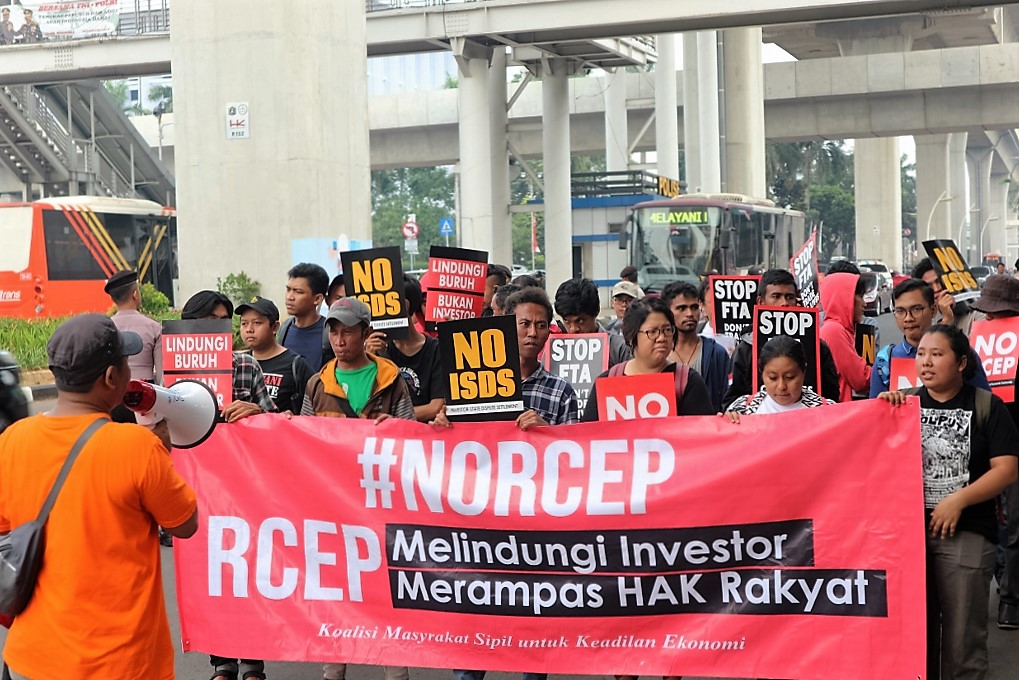Labour unions in Asia Pacific condemn RCEP deal
Trade Justice Unions - 12 November 2020
Labour unions in Asia Pacific condemn RCEP deal
The Asia Pacific region continues to be in the throes of the COVID-19 pandemic. Even as COVID-19 cases rise, economies struggle to revive, health systems are overstretched and job losses continue to mount, it is appalling that heads of states of 15 countries in the region have decided to sign the controversial Regional Comprehensive Economic Partnership (RCEP) on 14 November 2020. We, the undersigned trade unions, representing workers from sectors such as construction, manufacturing, agricultural workers, transport workers, food chain workers, public services, professional services and education in the Asia Pacific region categorically condemn this decision.
RCEP negotiations lasted for more than seven years and, throughout this period, have been shrouded in secrecy. Even now, on the eve of the signature, there has still not been public disclosure of the terms of the deal. Based on analysis of leaked documents, trade unions have consistently expressed concerns about the implications of RCEP on labour rights, sustainable development and democracy.
We recognise that trade and economic cooperation can advance opportunities for employment and sustainable development. But trade agreements such as the RCEP that are designed for and by multinational corporations are fundamentally undemocratic, threatening to deepen inequalities and increase the economic and political power of capital at the expense of workers and society at large.
The RCEP is a building block towards a free trade and investment zone in the Asia Pacific region. The COVID pandemic has shown us again that this is not the right path to follow. Instead of furthering a free trade project, countries should be collaborating on reviving their economies and expanding public goods. The recent proposal supported by a number of developing countries for a waiver from the protection of intellectual property rights enshrined in the TRIPS agreement of the World Trade Organisation for COVID-19 vaccines and other medical products is a promising step in the right direction. However, RCEP and other trade agreements that protect intellectual property rights, threaten the ability to secure a globally accessible vaccine.
The failure of the neoliberal model of economic integration is apparent in the diluted content of RCEP compared to the bar that was set by the Comprehensive and Progressive Agreement for Transpacific Partnership (CPTPP), which itself was diluted from the original demands laid out in the TPPA.
Yet, for most developing countries in the region, RCEP would lead to a loss of policy space. This, at a time when the United Nations Conference on Trade and Development warns us that the unequal economic recovery will require governments to make adequate use of their fiscal and policy tools to steer the recovery towards a more equitable development path.
Recent studies show that RCEP will not bring the economic benefits that some modeling exercises had predicted. SMART modelings show that economic benefits from import duty reduction will be negligible for most developing countries. Further, while traveling for business will benefit from facilitation of procedures for entry and temporary stay, workers face deteriorating working conditions in a race to the bottom under heightened competition in which migrant workers are facing the worse consequences. Regional cooperation based on a collective intent to promote decent work, quality public services and sustainable and inclusive development are a better solution.
The United Nations has warned that we face the greatest global food crisis in 50 years. In this context national governments must take comprehensive action to address hunger and malnutrition and ensure food security and universal access to the right to food and nutrition. Food and agriculture must be protected and regulated as a public good, to serve the public interest. It must not be further liberalized and commercialized to allow greater control by multinational corporations. RCEP threatens to deepen the crisis the UN has warned of.
RCEP does not only preclude governments’ ability to take measures required in the response to the COVID pandemic today, but also in the future. Rules that prevent future governments from introducing regulations that are required to protect the public interest undermine the national sovereignty of countries where our affiliated unions represent millions of working people who will be deprived of their rights.
We condemn this outcome and will continue working with our affiliates and allies to intervene in the enactment, ratification and implementation process of RCEP. We firmly believe that the trade union movement has an important role to play in challenging the current international free trade regime and ensuring that people’s rights and democracy are protected. We will continue our struggle to ensure the rights of workers and economic justice in Asia Pacific and beyond.
Endorsed by:
- Building and Woodworkers International, Asia-Pacific
- Education International, Asia Pacific
- IndustriALL
- International Transport Workers’ Federation
- International Union of Food workers, Asia-Pacific
- Public Services International, Asia-Pacific
- UNI Global Union
– END –






